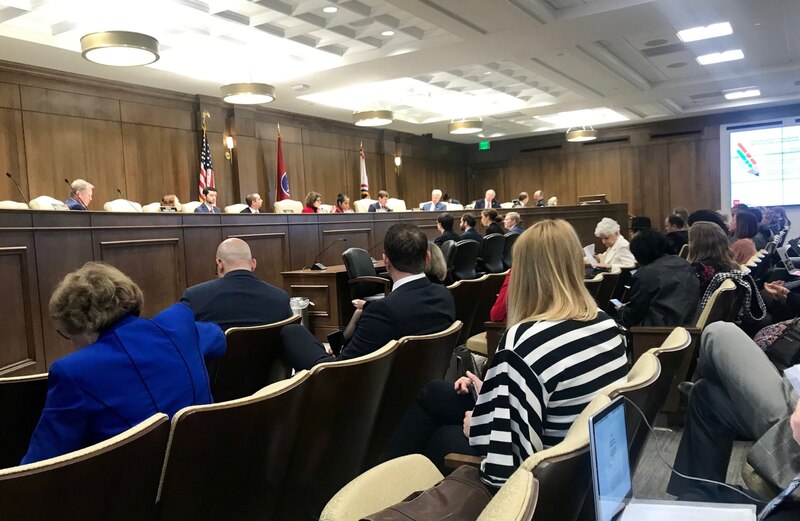Tennessee lawmakers grilled Commissioner Penny Schwinn Wednesday about the Department of Education’s relationships with certain private companies over recent textbook adoptions and millions of dollars worth of anticipated contracts under a major literacy proposal.
Schwinn appeared before the Senate Education Committee for a second straight week, where Sen. Mike Bell questioned decisions last year involving the state textbook commission and how Tennessee came up with its approved list of curriculum for English language arts.
The Riceville Republican said the department appeared to try to influence which publishers made the final cut, prompting a legal challenge by Houghton Mifflin Harcourt Publishing Co. That company’s petition, filed last November, charged that the department had “unilaterally altered the adoption process when it had already begun and significant steps already had been completed.”
Committee Chairwoman Dolores Gresham also grilled Schwinn about whether the department already has begun conversations with potential vendors over a half dozen contracts anticipated from Gov. Bill Lee’s $68 million literacy proposal, which is working its way through the legislature.
Schwinn said no, and Gresham reminded the department not to get ahead of itself.
“In case you or your staff haven’t heard, the principle by which we work is that the governor proposes, but the legislature deposes,” Gresham said. “So if the governor says you’re going to get $48 million [next year], well, the truth is, maybe so, maybe not.”
The tense 45-minute exchange took place as the legislature considers a literacy bill that would change the way that most Tennessee students are taught how to read. Switching to the phonics-first instructional approach would require hiring at least one vendor to retrain teachers. It also would revamp how the state’s teacher training programs instruct future teachers about foundational principles of literacy.
A day earlier, a House subcommittee approved the latest rewrite of the literacy bill, including a new provision requiring the department to use a competitive bidding process to choose all vendors associated with the rollout. Under Schwinn, the department has been criticized for a $2.5 million no-bid contract involving the state’s emerging education voucher program.
Schwinn was on the defense during most of Wednesday’s budget hearing. At one point, Bell played video of contradictory statements by Schwinn and Lisa Coons, the department’s chief of standards and materials, about the most recent textbook adoption process.
The 10-member Tennessee Textbook and Instructional Materials Quality Commission is responsible for recommending official lists of curriculum for various subjects, which then must be approved by the state Board of Education before local districts make their purchases based on the roster.
At issue is the department’s involvement in a decision to suspend the process two months before its completion and to hire Johns Hopkins University to review the textbook commission’s protocols for choosing curriculum. That review prompted changes that led to a revised list of approved publishers.
While curriculum choices and purchases are local matters, Bell said local school officials later felt “pressured” by the department to use certain companies from the revised list. He cited social media posts by the department and its leaders touting certain curriculum.
“It doesn’t give me a lot of confidence — not only in how the textbook commission is operating but the influence of the Department of the Education over the textbook commission and with the leadership of the Department of Education at this time,” Bell said.

Schwinn denied Bell’s assertions of department overreach on curriculum matters. Her staff, she said, has followed state law in working with the commission to identify high-quality resources for classrooms.
Since taking the helm a year ago, the commissioner has spoken passionately about the need to put richer texts in front of students as Tennessee seeks to boost its abysmal literacy rate. Almost two-thirds of the state’s third-graders read below grade level, based on state tests.
“The department does not get involved in the local adoption process in terms of decision-making,” Schwinn told Bell. “We recognize those are local decisions. … The department is in no way pushing any particular publisher.”
Gresham said the conversation isn’t over.
“There is more time to be devoted to this,” the chairwoman said. “Honestly, the questions that have come up this afternoon and last week give us pause.”

Gresham added: “If the textbook commission and the Department of Education’s relationship is not what it should be or what it’s intended to be when we reconstituted the textbook commission several years ago, then there will be steps taken to resolve those issues.”
Gresham asked Schwinn if she or her staff have had conversations with any vendors related to the literacy bill.
According to an online notice, the department hosted two meetings with potential vendors on Feb. 4 to discuss approaching contracts, including literacy supports.
“We haven’t met with any of the publishers related to that. That would have to be a competitive process,” Schwinn answered, adding that “internal conversations” at the department have focused on what invitations for proposals might look like.
Gresham responded: “I just want to make sure you’re not making those assumptions and going ahead and doing RFPs (request for proposals) for certain amounts of money when 1) you haven’t gone through the budget process and 2) the bill is rolled a week. So that’s really important.”
“To clarify,” Schwinn answered, “there are no RFPs that are published at all at this time.”

